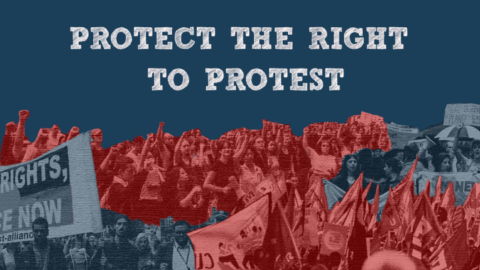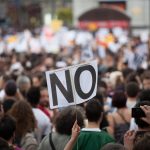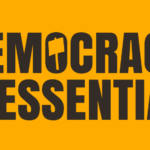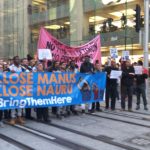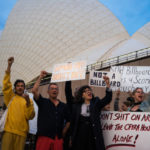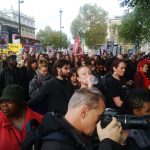NSW Labor Considers Revoking Draconian Anti-Protest Laws
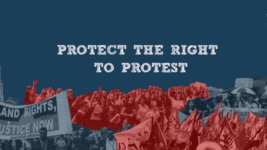
Another wave of extreme rainfall and flooding is only just beginning in NSW. This seems inconceivable after the deluge of March was already repeated in July.
Yet, NSW premier Dominic Perrottet’s “one-in-a-thousand-year” flood event is now happening for a third time in 2022.
The Perrottets of the political sphere are well aware the climate crisis is upon us. But they sit so snuggly in the pocket of the fossil fuel industry, that the only viable action to take is none, which is damning all, including their own children, to a drastically escalating uninhabitable environment.
Unsurprisingly, as the devastating weather events were mounting and the government was doing nothing about it, concerned citizens began staging more disruptive nonviolent direct actions to draw public attention to an emergency that politicians were conveying was a hoax.
In response, the NSW Liberal Nationals government jammed through some of the most draconian anti-protest laws this nation has ever seen in early April. And to the dismay of many of its supporters, especially the unions, Labor just waved the authoritarian measures through.
However, never too comfortable in its decision to support the laws, Labor is considering revoking them if elected to government next year, and a coalition of rights groups is currently calling on the public to contact their Labor representatives right now to ensure they reinstate the right to protest.
Protect the right to demonstrate
“Our governments have failed to deliver the strong action on climate change needed to stave off its worst effects and are instead punishing people who are calling for stronger action to save the planet and protect everyone’s human rights,” said NSW Council for Civil Liberties president Josh Pallas.
“The motion that we understand to be on the floor of the Labor conference this weekend calls for Labor, if it forms government next year, to repeal this law,” the solicitor told Sydney Criminal Lawyers.
The 2022 NSW State Labor Conference is taking place on 15 and 16 October, and the motion will be voted upon, which, if successful, will see the party revoke the Liberal Nationals anti-protest laws that can see a protester imprisoned for up to 2 years.
“NSWCCL has joined with Amnesty International and Legal Observers NSW to launch a letter writing campaign in order to call on Labor politicians to do the right thing and repeal these laws,” Pallas continued.
And the rights groups have made it very easy for constituents to inform their local Labor parliamentarians that this is what they want to see happen, as all one has to do is click this link, fill in the details and press send. It even ascertains who your local representative is.
A chilling effect
This year’s excessively heavy rainfalls and never-ending floods weren’t the major climate wake up call for Australians.
Indeed, it was the five-month-long bushfire season of 2019/20, which burnt down 20 percent of mainland forest that really made it hard to deny that the weather is changing.
This prolonged inferno also turned up the temperature on climate activism, and while some went the usual route of informing the authorities of planned demonstrations, others turned to nonviolent civil disobedience to get the message across.
Fast forward to March this year and groups like Blockade Australia and Fireproof Australia started taking more frequent actions involving blocking bridges, rail lines and roads to disrupt “business as usual” to make the point that if climate action is not taken, the sky is actually going to fall in.
So, with the aid of the mainstream media machine casting climate defenders as the most dangerous threat to society, NSW attorney general Mark Speakman and roads minister Natalie Ward amended an old law and passed some new ones designed to crush the climate movement.
Right now, if a protester blocks a road, a bridge, a tunnel or a major facility without prior permission from NSW police, they can face up to 2 years imprisonment and/or a $22,000.
Prior to this, the worst that could happen over taking such action was a $400 fine for obstructing traffic.
“The laws have had a demonstrable chilling effect on protest and have led to significant arrests of climate protestors from Fireproof and Blockade Australia,” Pallas maintained.
And his assertion is all too true. Climate actions, as well as protests in general have been thin on the ground since the laws passed. And when Blockade Australia came back with its old tactics in June, NSW police went berserk: staking out activist meetings, raiding properties and storming a picnic.
An attack on democracy
Rather bizarrely, what initially triggered the extreme protests laws was the roads minister being made late to work when Fireproof Australia blocked a road she was taking.
Later that same day, Ward appeared on the 2GB Ben Fordham program and told the radio presenter that she’d be creating more severe penalties.
And it was Fordham, again, who broke the news last month that the prospect of revoking the laws will be raised at the Labor Party conference.
The motion he read out over the airwaves states that the laws fundamentally attack “the right to peaceful protest that is at the very heart of our democracy”, and it adds that they also represent “a direct assault on unprotected industrial action”.
And despite what the reactionary shock jock thinks about the move, the fact that Labor is considering revoking the laws is promising, especially as at the time these laws were being passed, some Labor MPs were quiet vocal about their discomfort in supporting them.
“The motion on the floor of the Labor conference provides an important opportunity for Labor to stand up for the rights of protestors and signal that they will repeal this law,” Pallas said in conclusion.
“The ability to take to the streets and protest in defence of the climate is crucial, now more than ever.”
